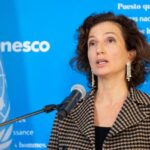The United Nations Educational, Scientific and Cultural Organization (UNESCO) has launched a “Global Toolkit for Judicial Actors on International Legal Standards on Freedom of Expression, Access to Information and Safety of Journalists” to serve as a training resource for judicial actors on international standards and regional frameworks, jurisprudence and norms on freedom of expression and related issues.
The new Toolkit, according to UNESCO, builds upon its two previous publications for the Judiciary, focused on Latin America and Africa, which were produced with a strong engagement of judicial actors, including national judicial training institutions from those regions.
In her Foreword to the Toolkit, UNESCO’s Director-General, Ms Audrey Azoulay noted that judges and other members of judicial systems play an essential role in ensuring a safe environment for journalists by bringing perpetrators of attacks against journalists to justice and by guaranteeing that international law is respected in national decisions involving freedom of expression and access to information.
She said by reinforcing the knowledge and capacities of the judiciary, the toolkit effectively contributes to the implementation of the UN Plan of Action on the Safety of Journalists and the Issue of Impunity, adopted by the UN Chief Executives Board in 2012 and recognized by the UN General Assembly in 2013.
The Plan of Action, according to Ms Azoulay, aims to create “a free and safe environment for journalists and media workers in both conflict and non-conflict situations, with a view to strengthening peace, democracy and development worldwide”.
She said: “It is our hope that this toolkit will be a useful tool for judges, public prosecutors, judicial training institutes, academics and judicial actors at large, so that respect for freedom of expression, public access to information, and the safety of journalists become an integral part of efforts to guarantee and promote human rights in our societies.”
The Toolkit provides a global overview of the theoretical and practical understanding of key issues related to the right to freedom of expression, and its contemporary legal challenges, especially in the digital age.
The publication of the Toolkit follows a global Massive Open Online Course (MOOC) for judicial actors on international standards on freedom of expression, developed in partnership with the Bonavero Institute of Human Rights at the University of Oxford, which gathered nearly 5,000 registered participants from 150 countries around the world.
The Toolkit contains five extensive modules through which it focuses on: the International Legal Framework on Freedom of Expression; the Legitimate Restrictions on the Exercise of Freedom of Expression; the Right to Access Information; Attacks against Freedom of Expression and the Role of the Judiciary; and Freedom of Expression on the Internet.
At the end of each module, assessments are proposed to test a person’s knowledge and command of the topics under consideration.
The Toolkit also includes additional resources specifically geared towards trainers at judicial training institutes, in order to further develop training courses on the right to freedom of expression, access to public information, and safety of journalists.
Currently published in English, UNESCO said the Toolkit would soon be available in more languages.







